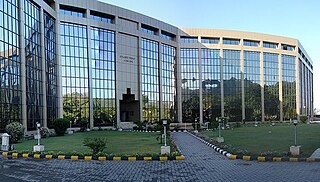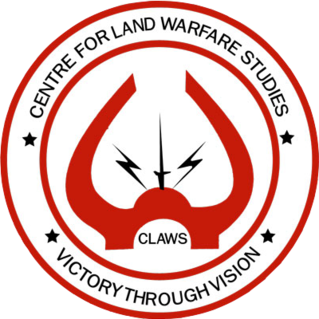Center for Strategic Research refers to the following organisations:
- Center for Strategic Research (Iran), former think tank based in Tehran
- Center for Strategic Research (Russia), think tank based in Moscow
Center for Strategic Research refers to the following organisations:
A think tank, or policy institute, is a research institute that performs research and advocacy concerning topics such as social policy, political strategy, economics, military, technology, and culture. Most think tanks are non-governmental organizations, but some are semi-autonomous agencies within government or are associated with particular political parties, businesses or the military. Think-tank funding often includes a combination of donations from wealthy individuals and personal contributions, with many also accepting government grants.

The International Institute for Strategic Studies (IISS) is a British research institute in the area of international affairs. Since 1997 its headquarters have been Arundel House in London, England.

The Center for Strategic and International Studies (CSIS) is a think tank based in Washington, D.C., in the United States. CSIS was founded as the Center for Strategic and International Studies of Georgetown University in 1962. The center conducts policy studies and strategic analyses of political, economic and security issues throughout the world, with a specific focus on issues concerning international relations, trade, technology, finance, energy and geostrategy.
Turkish think tanks are relatively new, but such think tanks provide research and ideas, yet they play less important roles in policy-making when compared with American think tanks. Many of them are sister organizations of a political party or a company. There are very few university think tanks.

The Islamabad Policy Research Institute (IPRI), established in 1999, is one of the oldest non-partisan think-tanks. It is affiliated with the National Security Division (NSD), Government of Pakistan. National Security Advisor (NSA) to the Prime Minister of Pakistan, Dr. Moeed Yusuf, is the ex-Officio Patron of IPRI.

The Australian Strategic Policy Institute (ASPI) is a defence and strategic policy think tank based in Canberra, Australian Capital Territory, founded by the Australian government and funded by the Australian and overseas governments, industry and civil society groups.

The Manohar Parrikar Institute for Defence Studies and Analyses (MP-IDSA), New Delhi, is India's foremost think tank for advanced research in international relations, especially defence, strategic and security issues, and providing training to civilian, military and paramilitary officers of the Indian government. It is funded by the Indian Ministry of Defence but operates as a non-partisan and autonomous body. It aims to promote national and international security by carrying out research on defence and security-related issues and disseminating the knowledge among the policy-makers and wider public.
The Begin–Sadat Center for Strategic Studies is an Israeli think tank affiliated with Bar-Ilan University and supported by the NATO Mediterranean Initiative, conducting policy-relevant research on Middle Eastern and global strategic affairs, particularly as they relate to the national security and foreign policy of Israel and regional peace and stability. The center's mission is to contribute to promoting peace and security in the Middle East, through policy-oriented researches on national security in the Middle East. It is located at the Social Sciences Faculty of Bar-Ilan University. The center was founded by Thomas Hecht, a Canadian-Jewish leader, and was dedicated to Menachem Begin and Anwar Sadat, who signed the Egypt–Israel Peace Treaty, the first peace agreement ever signed between Israel and an Arab country.
The Center for the National Interest is a Washington, D.C.-based public policy think tank. It established by former U.S. President Richard Nixon on January 20, 1994, as the Nixon Center for Peace and Freedom.
The Lakshman Kadirgamar Institute of International Relations and Strategic Studies (LKI) is a foreign policy think tank currently based in Colombo,Sri Lanka. The Hon. Minister of Foreign Affairs of Sri Lanka is ex officio the Chairman of LKI. LKI conducts independent research and functions as an autonomous organisation. LKI was established in 2006 and is named after the late Sri Lankabhimanya Lakshman Kadirgamar, P.C., M.P., and former Sri Lankan Foreign Minister. The Institute is the realisation of a goal actively pursued by the late Minister, to fulfill the country's need for a think tank in the field of foreign policy research and engagement. Its stated mission is ‘to engage in independent research of Sri Lanka’s international relations and strategic interests, and to provide insights and recommendations that advance justice, peace, prosperity and sustainability.’
CSIS may refer to:

Vladimir Stanislavovich Milov is a Russian politician, economist and the former chairman of the Russian political party Democratic Choice. From May to October 2002, he served as Deputy Minister of Energy of the Russian Federation. He was a member of the Federal Political Council of the democratic movement Solidarnost (2008-2010) and one of the founders of the coalition "For Russia without Lawlessness and Corruption". He was also the president of the Institute for Energy Policy, a Moscow-based independent think tank until 2013.

The Institut français des relations internationales is a think tank dedicated to international affairs, based in Paris, France.
BEST Education Network (BEST-EN), headquartered at James Cook University, Australia is an international, inclusive and collaborative network, focusing on the creation and dissemination of knowledge to support education and practice in the field of sustainable tourism.
The Danish Institute for International Studies (DIIS) is a public institute for independent research and analysis of international affairs, financed primarily by the Danish state. DIIS conducts and communicates multidisciplinary research on globalisation, security, development and foreign policy.

The Institute for National Security Studies (INSS) is an independent Israeli research institute and think tank affiliated with Tel Aviv University dealing in areas of national security matters such as military and strategic affairs, terrorism and low intensity conflict, military balance in the Middle East, and cyber warfare.

The Centre for Land Warfare Studies (CLAWS), New Delhi, India is an autonomous think tank on strategic studies and land warfare. The mandate of CLAWS covers national security issues, conventional military operations and sub-conventional warfare. CLAWS is registered under the Societies Registration Act, 1860 and is a membership-based organisation. It is governed by a Board of Governors and an Executive Council. Research at CLAWS is futuristic in outlook and policy-oriented in approach. CLAWS disseminate the products of its research to its members, members of the armed forces, decision makers, members of the strategic community and interested civilians. It also seeks to contribute to developing a pro-active strategic culture for India. The objective of the organization is to convey policy recommendations based on interactions, consensus and research projects to policymakers and experts. CLAWS has been ranked 67th amongst World Top Defence and National Security Think Tanks as per '2017 Global Go To Think Tank Report' published by University of Pennsylvania, USA.
Institute of strategic studies or Center for strategic studies is used by various research institutions around the world. They include: